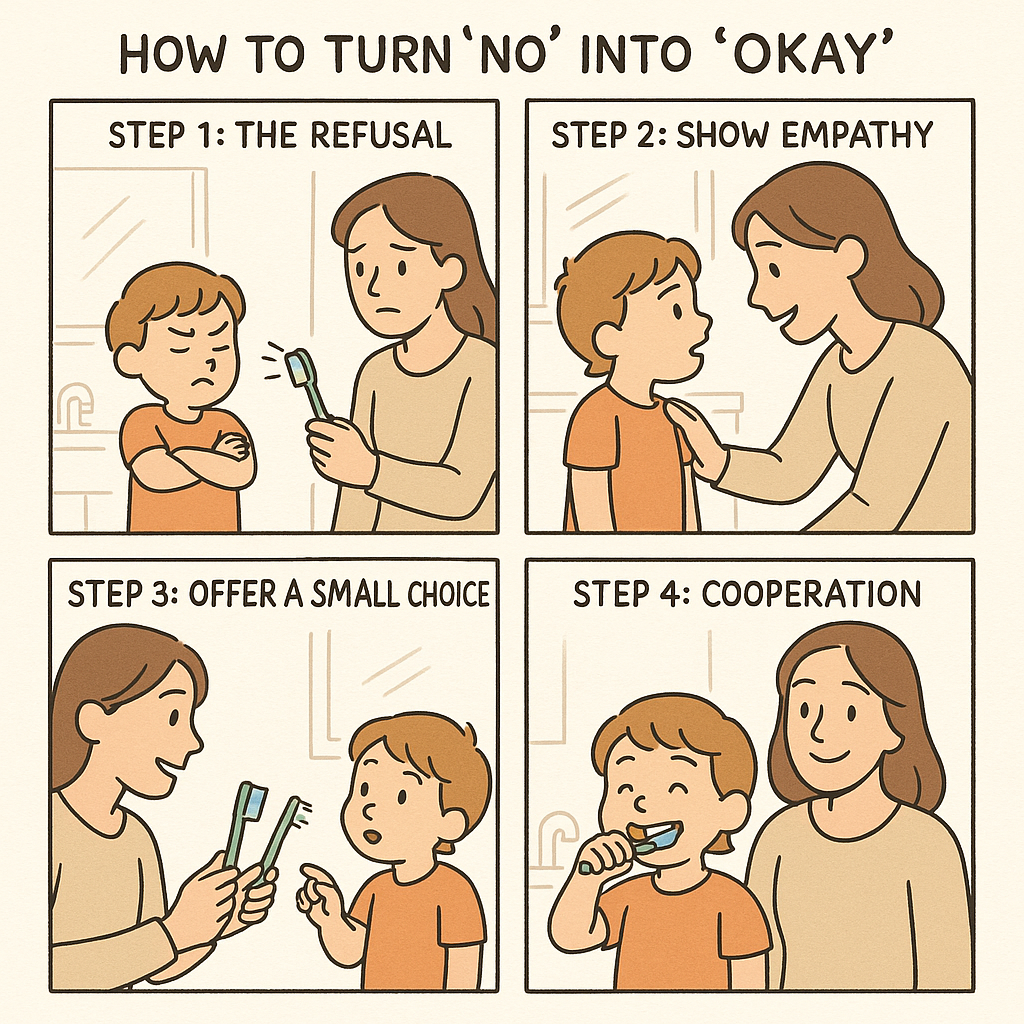That moment when your child crosses their arms and refuses to brush their teeth... again. Sound familiar? If you're nodding along, you're not alone in this daily dance of resistance. The truth is, a lot of 'No!' is really 'I feel powerless.' When routines feel like a trap, kids naturally push back - and the solution isn't bigger consequences, it's giving back a little control.
Understanding this shift in perspective can transform your entire approach to parenting challenges. Let's explore how to turn those stubborn refusals into willing cooperation with empathy and smart choices.
Acknowledge the Refusal with Understanding
The first step might surprise you: don't fight the 'no.' Instead, meet your child where they are emotionally. Try saying something like, 'You don't feel like brushing right now,' which shows you genuinely hear them. This simple acknowledgement helps validate their feelings rather than dismissing them.
When children feel heard, their defensive walls start to come down. This isn't about giving in to their demands - it's about creating emotional safety before moving forward with the necessary task.
Show Genuine Empathy at Their Level
Here's where the magic begins: get down to their physical level and connect. Kneel beside them, make gentle eye contact, and speak in a calm, understanding voice. This simple act helps their nervous system calm down instead of triggering a fight-or-flight response.
Your body language speaks volumes to children. When you tower over them whilst demanding compliance, you're inadvertently creating more resistance. But when you come down to their world, you're saying, 'We're in this together.'
Offer Small Choices That Give Back Control
Now for the game-changer: present tiny decisions that still achieve your goal. Ask questions like:
- 'Blue brush or green brush?'
- 'Shall we do foam first or rinse first?'
- 'Would you like to count to ten or sing the ABC song whilst brushing?'
These small choices give children back some control whilst the important task still gets completed. For bedtime battles, try offering choices about pyjama colours, which story to read, or whether they'd like the light dimmed gradually or all at once.
Create Calm Environments for Success
Reduce the pressure that often sparks resistance. Swap long lectures for short, kind prompts. Keep your expectations realistic for their age and energy level. Think dim lights, quiet voices, and one clear instruction at a time rather than overwhelming them with multiple demands.
When routines feel doable rather than demanded, children naturally become more cooperative. The environment you create can be just as important as the words you use.
Celebrate Cooperation and Build Confidence
When your child does engage, acknowledge it! This builds their confidence that routines can be manageable experiences rather than battles to be won or lost. Over time, your child learns a powerful lesson: 'I'm heard, I have some say, and I can do this.'
That sense of control invites cooperation - no power struggle required. You're not just getting teeth brushed or bedtime achieved; you're teaching valuable life skills about autonomy and cooperation.
Remember, this approach works because it addresses the root cause of resistance: feeling powerless. When children feel they have some agency in their daily routines, they're far more likely to participate willingly.
Supporting your family's daily routines and overall wellbeing is at the heart of what we do at Brainzyme. Our scientifically proven plant-powered focus supplements can help parents maintain the patience and clarity needed for these important parenting moments.
Ready to discover more supportive resources for your family? Visit www.brainzyme.com to explore how we can help.


 DACH
DACH
 FR-BE
FR-BE
 US-CAN
US-CAN



